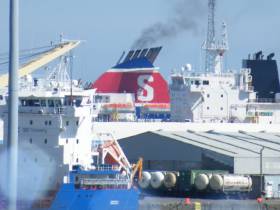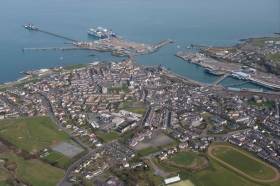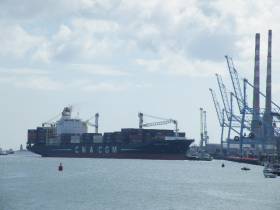Displaying items by tag: Hard Brexit
Plan by Government to Buy Land at Ports in Event of Hard Brexit
#IrishPorts - Plans to acquire port land the Government have said at Dublin Port and Rosslare is in order to prevent congestion caused by any new custom checks, in the event of a no-deal Brexit.
According to RTE News, the Government's contingency plan for a no-deal Brexit was published this evening (Wed, 19 Dec)
The document identifies 19 sectors in which action will be taken should the UK leave the European Union next March without a comprehensive agreement.
Under a chapter entitled 'Next Steps', the Government said it will prioritise "no-deal planning" at its next Cabinet meeting on 3 January.
It will also seek to introduce in the following weeks "necessary legislative measures" which would be required in a no deal scenario.
In a blunt introduction, the paper predicts "a no deal Brexit would potentially involve severe macroeconomic, trade and sectoral impacts [for Ireland]".
It continues: "Grappling with the enormous range of impacts both in the immediate short term and in the longer term will involve difficult and significant choices of a practical, strategic and political nature."
To read more including a comment from Tánaiste Simon Coveney, click here.
#Ports&Shipping - According to the Irish Examiner, a hard Brexit will cost the haulage industry €180m a year, or €40 per hour for every truck, in additional costs, warns the sector’s main representative body.
Irish Road Haulage Association president Verona Murphy told the Oireachtas budgetary oversight committee the sector has “no buffer against Brexit”. Increasing the cost of diesel to bring it in line with petrol will devastate the industry, she said.
More than 47,000 people are employed in freight transport, distribution, and logistics in the Republic, accounting for 2.5% of total national employment.
For more on this story, click here.
'Jobs At Risk in Holyhead' from Hard Brexit
#ferry - A ‘hard Brexit’ writes Daily Post could see jobs lost at the north Wales port of Holyhead, the Island’s AM has warned.
Speaking at the Senedd this week, Ynys Môn AM Rhun ap Iorwerth warned that some of the 1,000 jobs at Holyhead port could be at risk if Northern Irish ports continued to enjoy a ‘soft border’ with the Republic, while more stringent checks were implemented at ports on the British mainland.
“Well over 1,000 people are still employed directly in the port of Holyhead - far more in the wider economy are reliant on the port,” Mr ap Iorwerth said during a debate at the Senedd on Wednesday.
“Four and a half million tonnes of goods pass through annually. Only Dover is bigger in terms of roll-on, roll-off services.
“But, if Holyhead has been created and defined by its port in the past, there is no hiding the threats facing it now. Any barrier to the flow of vehicles and goods is a threat to the port and is, therefore, a threat to the well-being of the people of Holyhead.
For more on this story, scroll down the page from this link.
Firms Advised by Enterprise Ireland to Prepare for Hard Brexit
#ExportsToUK - In order to prepare for a hard Brexit, Enterprise Ireland is advising firms here amid growing signs the British government may opt to quit the single market in order to regain full control over immigration.
The Irish Times writes the agency’s chief executive, Julie Sinnamon, said it would be “foolish” to do otherwise given the current signals from Downing Street.
She was speaking in the wake of UK prime minister Theresa May’s suggestion that Britain would not attempt to cling on to “bits of EU membership” in its negotiations with Brussels.
“Irrespective of Theresa May’s comments, we have to prepare for the worst. And if it becomes a softer Brexit, then we’re in a stronger position,” Ms Sinnamon said at the publication of Enterprise Ireland’s latest annual report.
A key plank of the agency’s Brexit strategy was getting companies to look at new market opportunities while consolidating their position in the UK market, she said.
The UK’s share of Irish exports has fallen from 45 per cent to 37 per cent in the past decade, and this trend will likely be accelerated by Brexit, Ms Sinnamon said.
She also confirmed that a number of high-profile businesses in the agri-food sector here were now being courted by UK agencies about the possibility of setting up operations there in the wake of Brexit.
The Republic’s €10 billion food sector is the most vulnerable to Brexit with more than half of the State’s food output going to the UK.
“At this stage, companies are not saying we’re closing up shop and going [to the UK], but I’ve no doubt that the UK will get their act together and really begin to proactively try and attract more companies there,” she said, noting that a disparity in state aid constraints in the wake of Brexit would make things more competitive.
For more on jobs created by Enterprise Ireland and its annual report click here.
































































